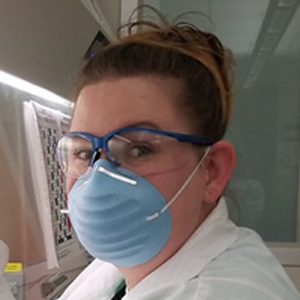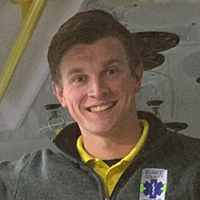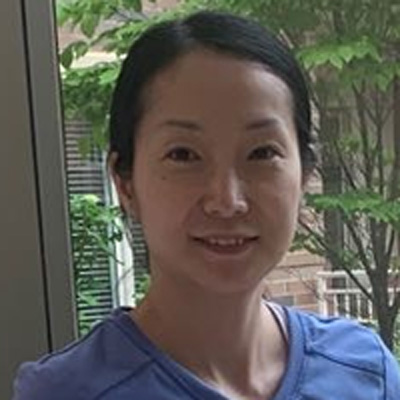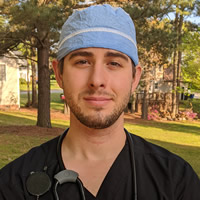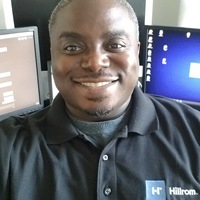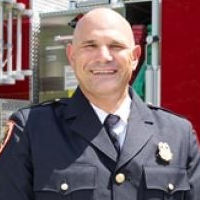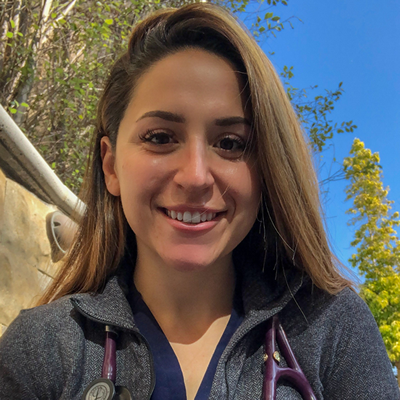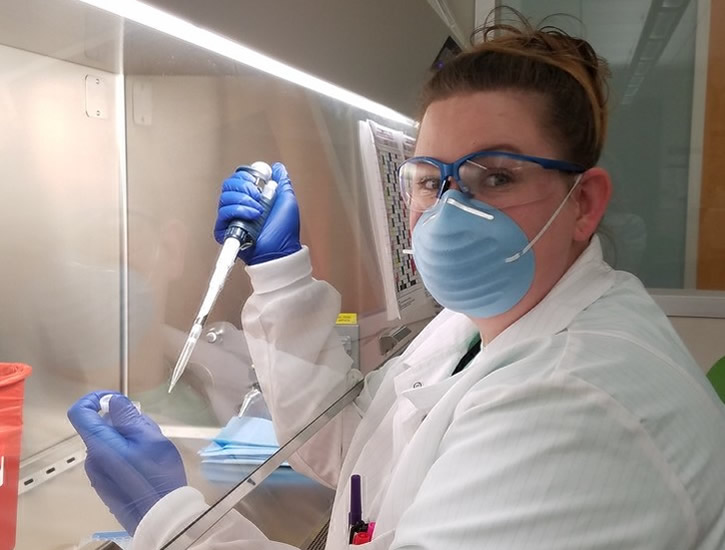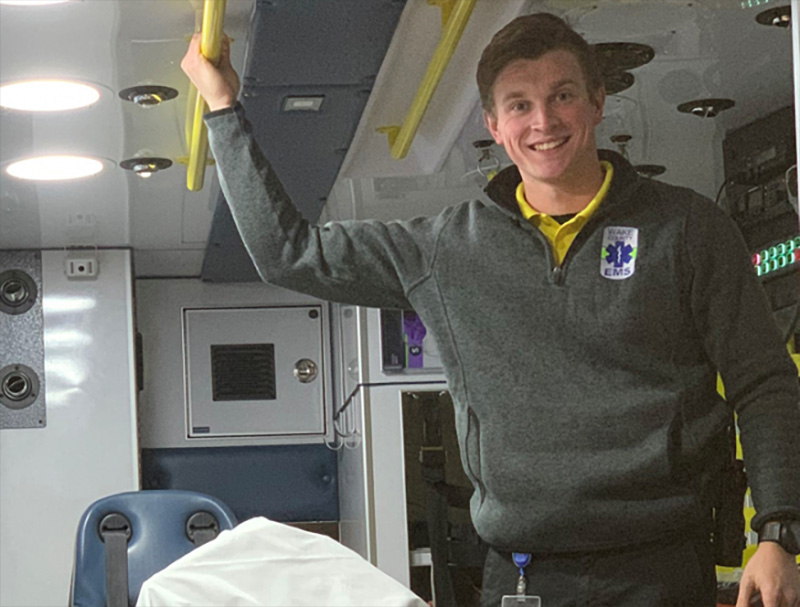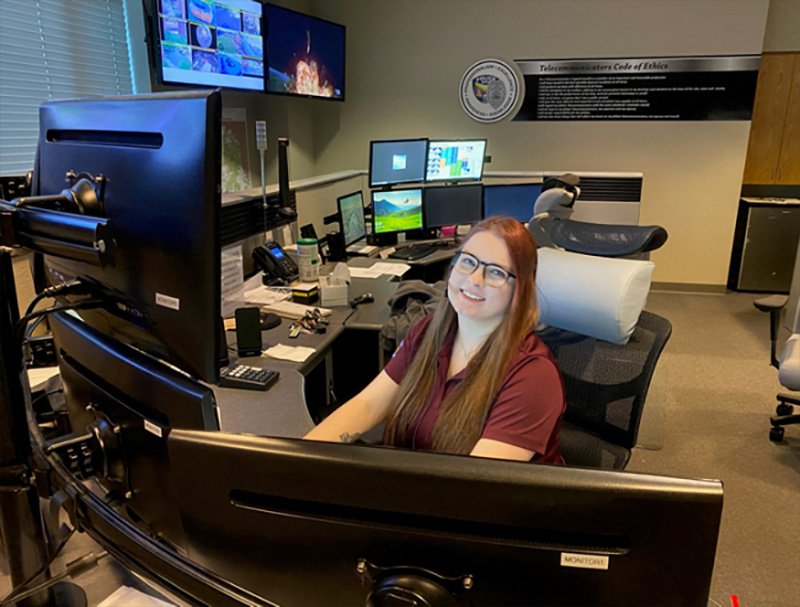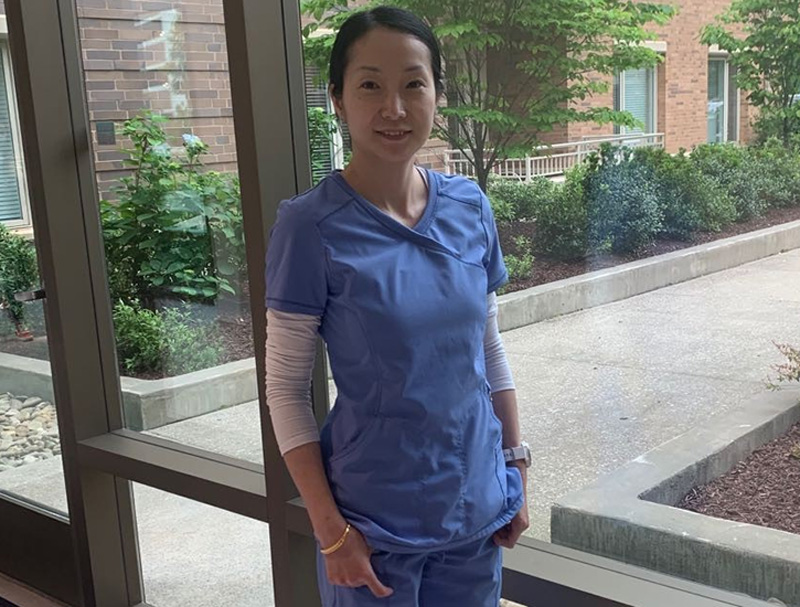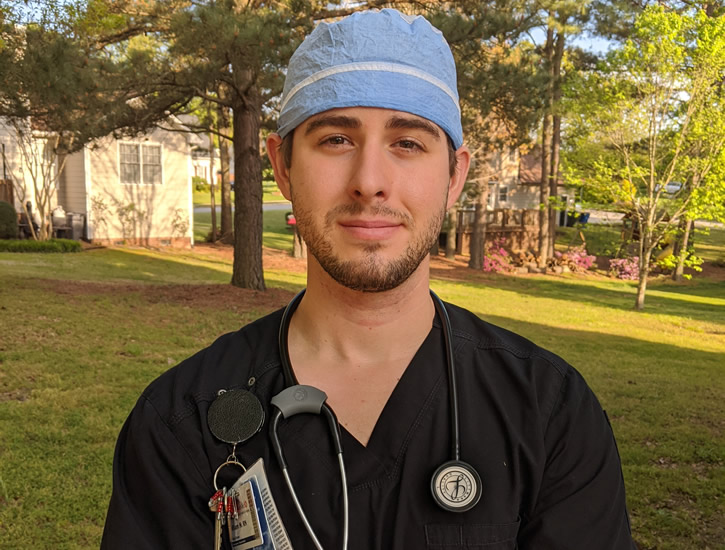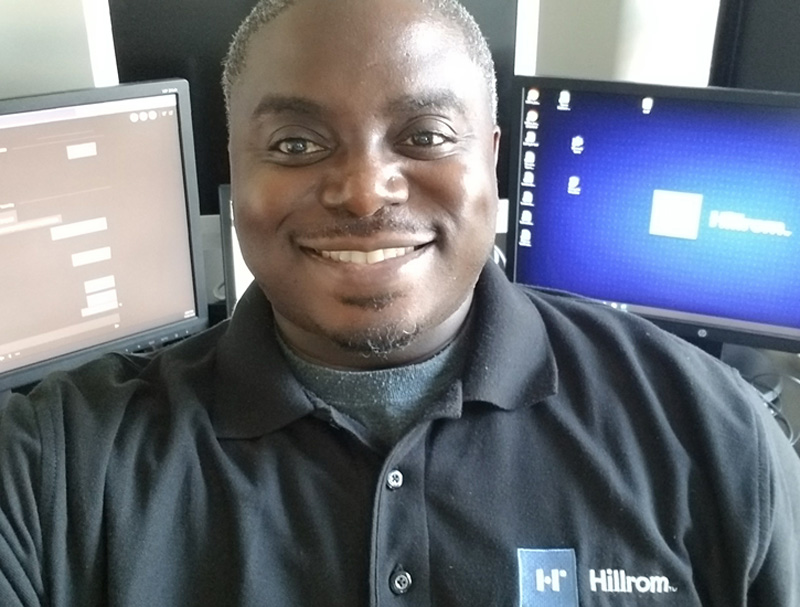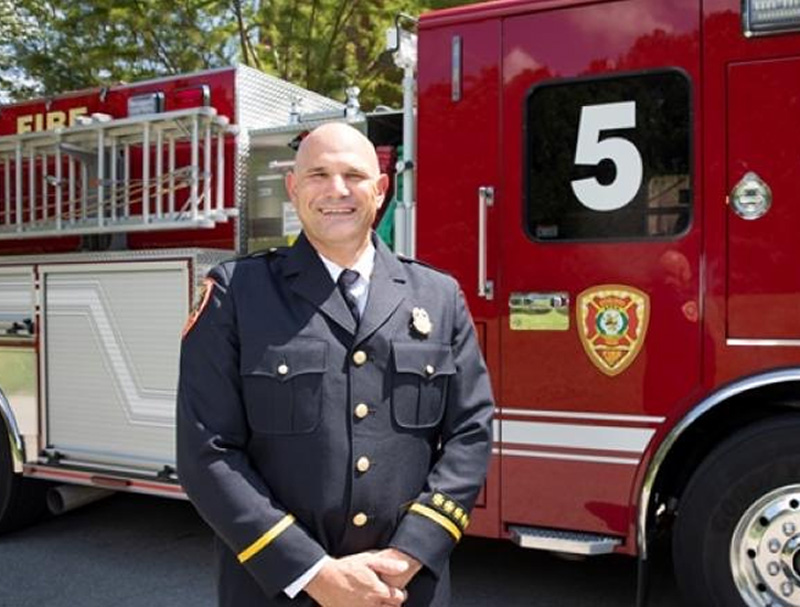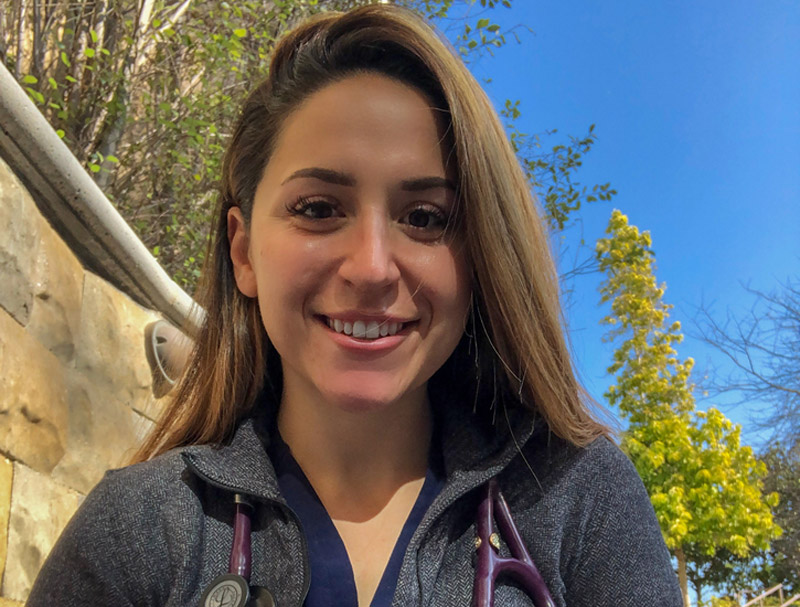Essential Wake Tech
Each year, Wake Tech educates and trains thousands of nurses, first responders, law enforcement officers, child care workers and others, preparing them for careers as vital service providers.
Now, in the light of the coronavirus pandemic, these professionals are being recognized as the "essential workers" they are – critical to the safe operation of our communities. They are required to report to work every day, regardless of personal risk, and they gladly answer the call.
Read some recent graduates’ stories and find out how they’re using what they learned at Wake Tech to keep others healthy and safe – and to keep our community going strong.
As a medical laboratory technologist during the pandemic, Rebecca helps process COVID-19 samples that arrive at the lab. Using a pipette, she aliquots, or separates, a portion of the sample and places it into a separate tube which is then tested by virology staff.
What does it feel like to be an essential employee during the pandemic?
"It is a little surreal, like you are in the middle of this never-ending rush. There is an eerie feeling in the air. Everyone is on edge, but there is still a sense of camaraderie and feeling that we're all in this together."
I work with an amazing team of incredibly smart laboratorians who I've learned something new from daily, and this pandemic has only validated my decision to go into this field. The lab is so underrepresented and misunderstood but one of the most vital roles in patient care, and I am proud to be considered essential."
How did your training at Wake Tech prepare you for what you have been experiencing on the job?
I felt prepared to start this job with confidence because of the spectrum of the course material covered. My instructors also played a huge role in my success. They really pushed me to do my best and believed in me every step of the way, and I would recommend Wake Tech's Medical Laboratory program to everyone. I would not have been as prepared for a global pandemic a year after graduation if it weren't for my amazing instructors.
As a paramedic during the pandemic, Alex answers emergency medical calls for service, including treating and transporting suspected COVID-19 patients to hospital emergency rooms.
What does it feels like to be an essential employee during the COVID-19 pandemic?
"Wake County EMS has done an amazing job of preparing us specifically for COVID-19 with everything from training beforehand to accurate dispatch information and PPE availability. As a result, even on the COVID calls I have run, I always knew what I was walking into and was able to prepare all appropriate precautions."
How did your training at Wake Tech prepare you for what you have been experiencing on the job?
"The education at Wake Tech was incredibly personalized and one-on-one, which allowed me to get an immense amount of education specific to my level of understanding. Regarding specific preparation for COVID, we utilized PPE regularly in simulation and clinical shifts, which helped me understand the clinical presentation of patients who required contact and airborne precautions."
As a dispatcher during the pandemic, Elizabeth answers emergency calls for service. During COVID-19, many of the calls relate to questions residents have about the state’s stay-at-home order.
What does it feel like to be an essential employee during the COVID-19 pandemic?
"Being an essential employee and still having to continue to show up for work during the pandemic has been a little more stressful due to the times, but it's something that you have to prepared for working in emergency services. We're always here no matter what is going on in the world. Despite all this, though there are still emergency calls for service that I process as a dispatcher that isn't COVID-19 related, such as domestic violence calls and welfare checks of people concerned for their loved ones."
How did your training at Wake Tech prepare you for what you have been experiencing on the job?
"I never imagined that I would be working during a national pandemic in my first year of being a dispatcher, but the class was a fantastic tool in getting my feet wet before jumping into this job. It made the transition into me being a dispatcher a lot smoother. It helped ground my expectations for what the job was, so I knew what I was walking into and already knew some of the questions to ask for calls which made training a lot smoother as well."
As a nurse aide during the pandemic, Jing checks on her home and hospice care patients and assists them with personal care, feeding, and social activities.
What does it feel like to be an essential employee during the COVID-19 pandemic?
"Most clients or residents are elderly people. Most of them cannot do activities of daily living by themselves and even have cognitive issues. They are vulnerable and have various medical conditions. It is important for us as caregivers to be there for them every day to help them. Some of them cannot even stand up or turn over in bed by themselves. During this time, I try to keep residents from infection and keep them safe and healthy as much as possible. I also spend more time doing activities like reading books, talking and playing games with them to keep them socialized."
How did your training at Wake Tech prepare you for what you have been experiencing on the job?
"The nurse aide I program definitely provided a strong foundation for the job. Concepts such as safety, fall precaution and infection are in the program practice. Even though I still need to further develop my skills with more experience, the program gave me a solid understanding of how to be a nurse aide. This is a rewarding job for me, and I’m proud to be a CNA."
As a certified emergency nurse, William has been working during the pandemic as a team lead in the Emergency Department at WakeMed, screening and treating COVID-19 patients. He will earn his bachelor’s degree from UNC Charlotte later this year and hopes to pursue a career as a nurse practitioner in the future.
What does it feel like to be an essential employee during the pandemic?
"Being an essential worker means the world to me. I am so glad that, even in times of economic turmoil, I continue to have a job that positively impacts people. I am proud to be a nurse, especially due to the fact that now and in the future, this profession will be needed direly.
I have worked as a team lead and COVID nurse for the past several months. This experience has taught me much in the ways of compromise and adaptation. It feels good to help these patients battling COVID, especially with all the misinformation that is currently circulating about the virus. As a calm and compassionate voice of reason, I am proud to assist patients when they fear for their lives."
How did your training at Wake Tech prepare you for what you have been experiencing on the job?
"I feel that Wake Tech prepared me very well. I recognized this when speaking with colleagues from other nursing programs. Wake Tech’s clinical experiences are unmatched, and the college tends to prepare very proficient and professional nurses right out of the gate. I owe my success to the wonderful clinical and classroom instructors who I mirrored my nursing off of. These individuals do so much for the nursing career as a whole. I thank them from the bottom of my heart."
As an information technology professional during the pandemic, Jordan implements Hillrom software in the hospital environment, which ranges from server configuration to network design. He installs software servers that manage nurse call systems and updates software on medical devices and smart beds if needed.
What does it feel like to be an essential employee during the pandemic?
"I feel like I play a vital role when the hospitals need my team to set up new beds or units to handle the COVID-19 cases in their area. It’s important for my team to have the skills for a quick turnaround time so a patient doesn’t have to wait to get treatment. Before the pandemic, I traveled to different hospitals, like St. Jude Children’s Hospital or Walter Reed National Medical Center, to install new Hillrom software and train the nurses on the new features. Now, we have a team that works with the nursing staff to make sure they have everything they need to meet CDC standards. During the pandemic, my team has been more involved in hospital layout to help the hospitals meet the needs of the COVID-19 patients.”
How did your training at Wake Tech prepare you for what you have been experiencing on the job?
"Wake Tech gave me the skill set and prepared me to work in the IT field. When I was a student, I was also working third shift, from 11 p.m. to 7 a.m., and many days I had to be in class at 9 a.m. the same morning. My instructors were very understanding, and Wake Tech always had classes to fit my schedule. The education and training I received at Wake Tech helped me get to the job I have today."
As a fire captain during the pandemic, Capt. Miles oversees the day-to-day activities of a crew of firefighters, providing training, direction, supervision and mentoring to help them stay safe on the job. As part of his duties, he fills in as the battalion chief, which has a bit more responsibilities. Some of these extras responsibilities include providing an effective command presence at significance events, communicating effectively with fellow supervisors to address daily needs and completing daily rounds to each fire station.
What does it feel like to be an essential employee during the pandemic?
"There's an element of fear when you're an essential employee during the pandemic. Working in close contact with the public and helping them during emergency situations puts me in a stressful situation each day and adding a virus we have very little understanding of increases that stress and worry. I worry I'll unknowingly bring COVID home to my 2-year-old, 12-year-old and 16-year-old children, my wife, my parents or my immunocompromised mother-in-law.
However, there's also an element of pride associated with working during this pandemic. Knowing that I can make a difference in the community and being able to help others during emergency situations is what I signed up for. I know Apex Fire Department has provided me with the best protection and training they can at this point in the fight against COVID, and I will use this knowledge to help others."
How did your training at Wake Tech prepare you for what you have been experiencing on the job?
"My education at Wake Tech has allowed me to advance in my career and has allowed me to lead my crew confidently throughout this pandemic. I am grateful to the instructors at Wake Tech and the opportunities that have been afforded to me from this institution. I was able to receive my degree at the age of 47, while holding a full-time job and other part-time jobs and raising three children with my wife, all because Wake Tech offered online instruction that was flexible. Thank you Wake Tech for this valuable opportunity!"
During the pandemic, Gianna has worked various assignments as an intensive care unit (ICU) travel nurse treating critically ill COVID-19 patients. She is currently working at St. John’s Regional Medical Center in Oxnard, California, which has experienced a critical need for ICU nurses due to the high volume of COVID patients. Gianna is also pursuing her bachelor of science in nursing and hopes to eventually become a nurse anesthetist.
What does it feel like to be an essential employee during the COVID-19 pandemic?
"Every day, the opportunity to care for others feels like an honor and a privilege. The spotlight on frontline workers has hopefully illuminated the collaborative and integral role nurses play in the patient care process to the public and provided education on the importance of nursing education. I’ve never so personally felt the gravity of the nursing shortage. Overall, 2020 was the most heartbreaking year of my career. Helping families say goodbye to patients on FaceTime, only being able to touch patients through multiple layers of PPE, the overtime hours, learning new techniques and concepts on the fly, the codes, burnout, keeping up with the rapidly shifting best practices guidelines and the moral distress of a disease that has taken so many lives in such a short amount of time. The disease process of COVID-19 has been devastating to witness firsthand and has been all around challenging. The resilience of nurses and the people they care for has inspired me and motivated me during the most difficult days. I’ve never been more proud that this field chose me."
How did your training at Wake Tech prepare you for what you have been experiencing on the job?
"My education at Wake Tech provided the foundation for me to grow into the nurse I am today. It wasn’t just an education. It was an ongoing support and encouragement network where I was constantly put into situations that challenged and allowed me to grow. The open-door policy helped me to receive support from faculty when needed but also build lasting professional relationships. Wake Tech’s state-of-the-art Sim Lab gave us all the opportunities to learn hands-on lessons in a safe and controlled environment and our early-on clinical immersion model meant we graduated with more patient care hours than many other nursing programs. It’s my opinion that this makes a huge difference in your first year as a nurse to have those experiences. I was held accountable, but I was also loved through the process, and for me, that made all the difference. I’m deeply grateful for every nurse who poured into me, and I carry them with me in every patient interaction. The nurse I am is a culmination of my instructors. I struggled early on in the program, and I know that, without the outreach from faculty, I would not have graduated. I continue to mentor, precept and tutor nursing students because I feel so passionate about nursing education and the importance of surrounding students with nurses who want to see them grow and succeed. I try to be the nurse I needed when I was a student."
2023 Footer Column 1
2023 Footer Column 2
- Wake Tech Mobile App
- Help & Support
2023 Footer Column 3
- Connect
919-866-5000
Contact Us | Terms of Use | Privacy Policy | Campus Policies | Site Map
